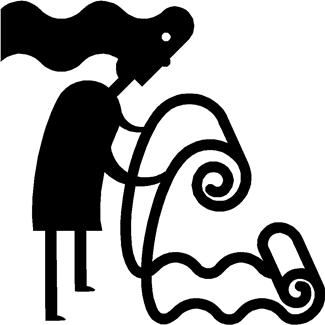The 5 Biggest Mistakes Of Habit Change
THE 5 BIGGEST MISTAKES OF HABIT CHANGE (ISSUE 96)
By Diane Gold
What if we could boil down the 5 biggest mistakes of habit change? Could we use them to make changing habits easier? And out of them create the 5 Commandments Of Habit Change?
Everything we read, hear, experience, learn, touch, smell, feel helps in the change process. But we always have to work hard to make change. I have turned myself inside out more than once, and I believe it to be a worthwhile activity.
MISTAKE 1) Look at more than one habit at a time.
In order to succeed, we must focus. We need one-pointed mind.
Remember the quote in The Last Samurai, where the Japanese general tells Tom Cruise’s character,
“Too many mind. No mind,”
when he is training him in the sword? (Go to http://000chi.com to hear the quote.)
Focus On One Habit At A Time
He is referring to our ping pong ball minds. When we look at many things, we lose focus of all of them. When we look at one thing, we are able to focus on it. One Habit At A Time!
MISTAKE 2) Picture the end result instead of the first step.
 When learning to change a habit, looking too far ahead is usually a deal breaker. If we are looking at the end result, meaning that we changed our habit; it may look vast, overwhelming, impossible, certainly difficult that it’s quitting time, quitting the process of change, that is.
When learning to change a habit, looking too far ahead is usually a deal breaker. If we are looking at the end result, meaning that we changed our habit; it may look vast, overwhelming, impossible, certainly difficult that it’s quitting time, quitting the process of change, that is.
That’s why we only look at the very first step, whatever that step is for each of us at the moment. The first step is NOT the first step in the process. It is the one step directly in front of us. I realize that this same step may need to be done over and over and over again 25 times in one day. This depends upon how many times a cue, urge, trigger presents itself.
Here’s what I mean. Let’s say we decide that when we get the urge to __________, and I am leaving this blank so that any habit can be filled in; we will drink 16 ounces of water. We will also drink water before every meal. Supposedly, it’s difficult for the body to tell if it is hungry or thirsty, so water can fill us up, especially if we have the patience to wait 20 minutes (which most of us don’t) before we __________. Also, the act of drinking the water will change our focus from the ______________ to the water. It may be just enough to allow us not to ____________.
MISTAKE 3) Commit to change our habit forever.
 When we decide we will change a habit forever, we are locking ourselves in a prison. To give up an old behavior is not as difficult if we tell ourselves that we might be able to go back to it at some point in the future. It makes it easier to start, and it is not as scary a process. Change A Habit For Today, Not Forever
When we decide we will change a habit forever, we are locking ourselves in a prison. To give up an old behavior is not as difficult if we tell ourselves that we might be able to go back to it at some point in the future. It makes it easier to start, and it is not as scary a process. Change A Habit For Today, Not Forever
It’s easier to say,
“I will do this today,”
than it is to say I will never do this again.
So, our change is for today, not for forever. One Urge At A Time.
MISTAKE 4) Stop doing the action that actually worked to get us to change our habit because we think it’s no longer necessary.
 How many times have we thought we had ourselves together, and we stopped behaving in the way that was working for us? We had changed our habit so long ago that we thought we could stop the technique that got us to change the habit?
How many times have we thought we had ourselves together, and we stopped behaving in the way that was working for us? We had changed our habit so long ago that we thought we could stop the technique that got us to change the habit?
This happens with the weight loss habit all day long. That’s why people lose weight for a year or five, then gain it back. That’s why substance abusers get clean for 10 years and then start their old behavior.
We can’t go to the track once; we can’t do drugs recreationally; we can’t eat chocolate cake for lunch. Because we will cause the cues to start hitting us in the head again. Kind of like a trigger on a gun that is broken. Every time it is fired, it cocks itself. And every time it is cocked, we have the itch to execute our old habit.
We can’t fight biology. Our habits live inside us, and we can’t take them out of us. We can choose to change a habit to make another dormant. If we stop the new, in most cases, we will revert back to the old way of behaving because it is so natural to us. That is why once we make a change, we have to maintain it for as long as we want the old habit to be hidden.
Here’s an example of how the habit of speaking one way reverts to an old way in a flash.
We speak with the accent of our region. The people around us sound the way we sound, and we sound the way they sound. No one in our region says we have an accent because we all speak similarly.
What happens if we move to a different region? According to our new neighbors, we have an accent. They sound like each other, and we don’t like them. People usually smile about it because we sound very much like the place from which we came. We smile, too.
So we end up living in the new region for about 10 years. And we start to sound more and more the way the people of the region sound. This is not really a phenomenon. It is a combination of:

1) wanting to fit in even if this desire is unconscious. We are human and we like to fit in;
2) learning our new accent unconsciously through continually hearing the new region speech all the time and, finally,
3) making an effort to learn the accent of the region so that we can further call it home.
What happens if our best friend from back in our old region comes to visit? We instantly start to speak the dialect or accent of our old region. In a flash. We go out to town to introduce our best friend, and we are speaking the way we were when we first arrived.
Here’s the explanation.
We learned our original habit, our accent from where we were born.
We changed this habit, partly by choosing to fit in and partly through unconscious, auditory repetition.
We changed our habit back to the original habit in a heartbeat because all our habits are always ours.
We choose a new behavior so as not to express the old habit. When we don’t, our old habit comes out (usually). So we need to be diligent even if we have been doing the new habit caused by the new action/behavior for a decade or longer.
The story about the accent focuses on a habit that is not harmful. And, most of the time, the accent habit situation is harmless. But what about the following scenario?
 Imagine a U.S. Senator whose family members all speak street language. She was the only member of the family to go to school. She was raised on “ain’t,” “anyways,” “nucular energy,” “athalete,” “asterik,” “supposubly,” “mischieveeous.” She goes to visit her original home for a week and her entire family speaks their normal street speak to her or with her. Then she comes back to D.C.
Imagine a U.S. Senator whose family members all speak street language. She was the only member of the family to go to school. She was raised on “ain’t,” “anyways,” “nucular energy,” “athalete,” “asterik,” “supposubly,” “mischieveeous.” She goes to visit her original home for a week and her entire family speaks their normal street speak to her or with her. Then she comes back to D.C.
All of a sudden, at a dinner with the President, she starts telling a story about her family. She forgets where she is and begins speaking in her old dialect with her old street slang.
People judge people by their speech. And people don’t use slang in the political halls of our government because of it. Bringing out her old habitual speech could have serious credibility consequences since the public must trust her and some of that public equates her speech with her ability to lead. Her constituents might lose trust in her; and political peers might judge her unworthy of her post.
Fortunately, if someone has become a U.S. Senator, she will have a strong foundation in having learned how to speak and know what to speak in front of whom. But the old speech is there like all our old habits.
5) Forget to enjoy the idea of the new action that led to the new habit which is what helped us conjure the power to change.
This does not apply at the beginning of the habit change process. For as long as it takes, we are learning a new set of behaviors, and enjoyment is important but second to doing the behavior without intellectualization.
The ONLY thing that is relevant is doing the new action. Nothing else.
 Once we have accomplished doing the new action and have a routine going that includes the new behavior, we can rejoice in the fact that we have begun to change the habit and that we had the power to start. If we forget to be joyful which includes acknowledging ourselves for changing, we are missing out on the joy that can sustain the new behavior.
Once we have accomplished doing the new action and have a routine going that includes the new behavior, we can rejoice in the fact that we have begun to change the habit and that we had the power to start. If we forget to be joyful which includes acknowledging ourselves for changing, we are missing out on the joy that can sustain the new behavior.
CONCLUSION
These 5 mistakes create powerful action steps from which to learn. They are simple ideas that, when executed, have much power, much wisdom and many success statistics.
Here are the steps:
ACTION STEPS – THE FIVE COMMANDMENTS OF HABIT CHANGE

1) Focus on one habit at a time!
2) Picture the first step in front of you now! When accomplished, picture the first step in front of you now!
3) Commit to change your habit for only the moment you have an urge or for an hour after it or for a day. Any longer is too overwhelming.
4) Continue doing the action that changed your habit, even if it doesn’t seem as if you need it.
5) Enjoy the idea that we have made the change (further on down the process).
____________________________________________________________________
____________________________________________________________________
FEEDBACK
Please leave a comment and LIKE.
DIANE GOLD, AUTHOR
Diane Gold, Founder of Warriors of Weight, Turning Habits Into Health, is a mentor in tai chi, kung fu and meditation, a music, fitness and stress expert, dedicated mom, studying plant-based nutrition and habit change.
She has seen the same mistakes over and over when people change habits or make the attempt. She says,
“We can learn as much from our mistakes as from our successes. We may even learn more because we are acutely aware of our falling short of our goals and pay attention so that we can strive to reach them.
“We are fortunate to be able to learn from others’ shortcomings. All living things do. Because we have an emotional and ego-driven minds, it is not as easy for us to take the errors of others as gospel. We are often blinded by egos, unlike our animal friends. If they are blinded, it is usually by the need to survive.
“Let us turn these five mistakes of habit change into action steps. Each one has the potential to make the ultimate difference in the outcome of our goal for habit change.”







